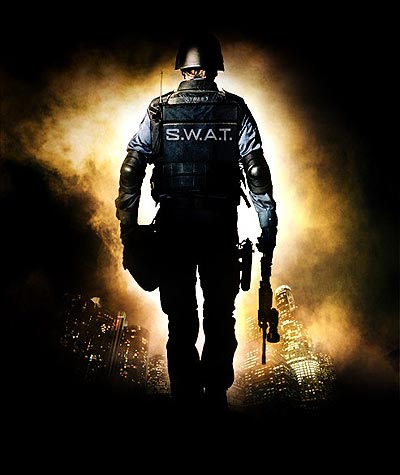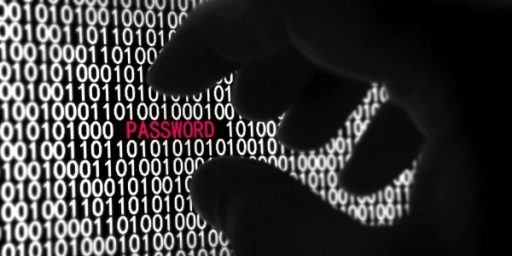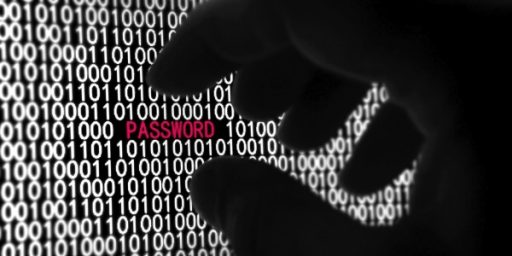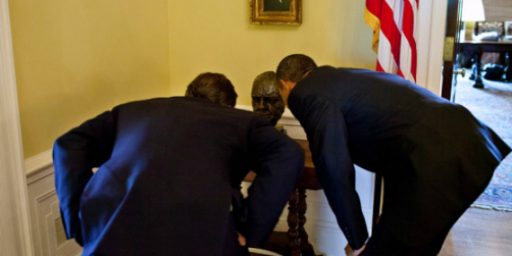The Perils of Unsecured WiFi and Overzealous Law Enforcement
Yes, please secure your home networks. But also: perhaps the police need to reevaluate their tactics.
 Via the AP: NY case underscores Wi-Fi privacy dangers
Via the AP: NY case underscores Wi-Fi privacy dangers
Lying on his family room floor with assault weapons trained on him, shouts of “pedophile!” and “pornographer!” stinging like his fresh cuts and bruises, the Buffalo homeowner didn’t need long to figure out the reason for the early morning wake-up call from a swarm of federal agents.
That new wireless router. He’d gotten fed up trying to set a password. Someone must have used his Internet connection, he thought.
“We know who you are! You downloaded thousands of images at 11:30 last night,” the man’s lawyer, Barry Covert, recounted the agents saying. They referred to a screen name, “Doldrum.”
“No, I didn’t,” he insisted. “Somebody else could have but I didn’t do anything like that.”
“You’re a creep … just admit it,” they said.
Law enforcement officials say the case is a cautionary tale. Their advice: Password-protect your wireless router.
The story goes on to detail the perils of not password protecting your home WiFi network and even points out that unsecured networks of that type are illegal in Germany.
I will concur: password protect your network.
However, I think that all that discussion buries the main issue here: do we really need paramilitary style raids with no-knock warrants for people suspected of downloading child pornography? I could understand such a raid on a place that was actively producing said materials, but where is the need to bust down doors and make citizens lie prostrate on the floors of their homes with guns pointed at them for the mere suspicion that they have downloaded something illegal? Even if the suspicion is that that the person is distributing, why can’t a normal search warrant be issued? Why a raid?
Since the actual harm to the children in question takes place well before someone can download the images, it seems that the need for rapid, violent action is already gone. There is no clear and present risk to anyone that can be prevented by a raid—and certainly not enough risk to warrant the harm to potentially innocent persons that such a raid could inflict.
The trend towards the militarization of the police, brought to us first by the drug war, is quite disturbing. I am all for arresting people who break the law, but military approaches to law enforcement turn citizens, who are presumed innocent (lest we forget) into presumed enemies of the state. This is not an appropriate approach, especially when dealing with something as tenuous as an IP address for evidence. Even if a given cybercrime did originate in a given location, there is no way to know which person in said household committed the crime. To bust through the door, toss people to the ground and then start sorting things out is not what I want out of law enforcement agencies in a democracy.
Surely one of the main purposes of law enforcement is to make us safe in our homes from criminals. If, however, our homes can be invaded on fairly scant evidence (or, like in so many drug-related cases, because of error), then it seems to me that we have lost our way to some extent.
Postscript: After writing the above, I see that Radley Balko (not surprisingly) has addressed the story as well:
Maybe it’s not such a good idea to send the SWAT team after someone suspected of downloading—not even manufacturing—child porn in the first place. Are people who download kiddie porn known to be heavily armed?
Indeed.





It is now standard police practice in many places to shot your dog on the way in during a raid like this. Swat can say it is sorry all it wants, but your dog is stays dead. Good thing this guy had no dogs.
Our cops are turning into the army and our army are turning into cops.
And with the pro-cop makeup of the courts, I doubt that the family has any legal remedies available to them. And so, this behavior will continue.
All too often, the police are just thugs in blue.
“All too often, the police are just thugs in blue.’
Anyone who volunteers to be a cop or a soldier should be turned down.
Unfortunately, we’ll never bring back the draft.
Dear police force: I am committing various crimes here in my home. You know, a little of this, a little of that.
If you should happen at any time to raid my house, please bear in mind that there are two dogs. Two. The one that howls and the one that pees. Technically both are wife’s dogs but I don’t think that should impede your law enforcement efforts.
Remember there are two. And leave the cat alone, she’s cool.
If similar happens in my local area I will make massive protests. But my area had a sad case 6 years ago so we don’t use SWAT today unless it is a serious condition. But most of the country isn’t that way. (Google: Brahm Gig Harbor Tacoma). I saw this article and thought WTF, the point is entirely missed.
IGNORANT COPS, STUPID COPS, Were I the subject of this illegal raid, nothing less than firing with punitive letters of reprimand would stop me from suing their asses off. And the judge should undergo disbarment..
I concur with the post and most of the comments, particularly with regard to Michael’s dogs.
Just like with David Koresh, who the local Waco sheriff would have been easy to arrest, they couldn’t park outside the house and arrest the guy when he went outside.
Had to get the “no-knock” warrant and do the paramilitary raid at Oh-Dark-Thirty.
I’d forgive the mistake on the unsecured WiFi, but I’d sue on the no-knock raid.
Besides the excessive force used in this case, there is the excessive laziness shown by police. How difficult would it have been for police to check if the signal was secured or not before knocking down a door and putting lives at risk? The article asks the same question.
Given the weaponry and the training of the police force, tell me, do people really think they have a chance of taking up arms against the government to defend their rights? The subject comes up on the local talk show from time to time. It’s not like in the movies where an over turned table will stop any round short of an anti-tank round. Nor is it like Star Wars where one lightly clad rebel can defeat dozens of heavy armored Stormtroopers. Might may or may not make right, but it sure helps to win battles.
One last thought. People don’t fly backwards when hit, it violates Newton’s Third Law.
In executing a warrant for a computer crime, all judges should require that prior to entry, there should be an investigation to see whether there is an unsecured wi-fi router on premise. If there is, the the warrant should be invalidated and only reissued on a higher standard of probable cause, like monitoring the illegal traffic while sniffing to demonstrate that local mac addresses are the ones doing the conduct.
An unsecured wi-fi zone is not only a crime, it is a social phenomenon of on-line neighborliness that many do on purpose to facilitate increased connectivity to the Internet, a social good. The executive has no business punishing this conduct.
http://www.theyeshivaworld.com/news/General+News/90315/Burning-Question%3A-Is-Wi-Fi-Squatting-Illegal%3F.html
I don’t agree with the use of extra force, but the police probably use the swat teams for the same reason that they do against bookies: they don’t want the suspects to destroy evidence quickly. That being said, they could have waited and nailed him when he left his home.
So in other words Chad, the lives of police officers and citizens are worth less than the evidence of possible wrong doing.
Very good. Tell us how America is the greatest nation on the planet?
TMLuta,
I’m going to assume you are new to this issue of the use of overwhelming force by police agencies when dealing with serving warrants. Now repeat after me:
When judges grant a search warrant they are little more than walking and barely sentient rubber stamps.
Judges will sign any search warrant for any reasons real or made up. I wouldn’t even be surprised if some sign them after the search has been done.
Don’t put words in my mouth Steve. I offered a possible explanation for why they were doing it.
And it sucks as an explanation although that is the argument. These kind of tactics are extremely violent and it happens everywhere. Even the smallest towns that can go years with little or no violent crime let a lone a situation requiring a SWAT team have them now and to justify them…use them.
Bottom line: the drug warriors and tough on crime jerks would rather protect evidence than lives.
If you fit in the drug warrior/tough on crime category and don’t like that depiction too bad.
Local and state politicians need arrest rates and conviction rates in order to get votes.
As usual, it’s the people who are the problem. Any time you make the knee-jerk decision to support whoever seems “toughest” you’re buying into the militarization of the police. And you’re supporting the distortion of what is supposed to be a system of justice and making it a system of conviction and imprisonment.
A lot of this comes from Hollywood, where the fictional police are forever being hamstrung by that darned old Bill of Rights and where liberal judges let baby killers go free on a technicality. That all makes for good drama, but it bears no relationship to reality.
In reality the baby killers go free because they’re never caught by a police force that spends its time busting in the doors of pot dealers and racking up high conviction rates on minor or victimless crimes.
Steve, maybe you should go back and actually read what I wrote in my first comment. The part where I said: “I don’t agree with the use of extra force.” Offering an explanation isn’t agreeing with the policy.
Chad, in addition to simply waiting for the suspect(s) to leave, my understanding is that a vast majority of the time, deleted data can be recovered. So it’s not exactly like flushing pot down the toilet.
Steve – I understand the world as it is and the sad state of judicial review of warrants. My comment was one of how the world should be.
Doing a drive by and seeing that there’s an open wifi network is something that should be SOP. What are they going to do when it’s kiddie porn coming through a Panera bread wifi hotspot? Are they going to do standard SWAT procedures with the dozens of customers that are on premise?
But but but…you don’t get to do a dynamic entry then. No flash bangs, no assault rifle, no cool SWAT outfit, and no chance the sleepy homeowner thinking it is a break in and going for his own weapon….in short, no fun.
C’mon get with the program.
TMLutas,
These morons can’t even be arsed to double check the house number. Drive by and look for an open wifi? Are you kidding?
Deploy flashbang grenades and storm the place.
Why not, so what if some civilian gets hurt; it is for the kids after all.
Trumwill, it depends on how you delete a file. You can delete file that can’t be recovered(except for a long, expensive process that no one will do). If I was playing with illegal files on a computer or was a hacker, I’d probably have a macro which permanently deleted any incriminating files with a simple keystroke combination. That being said: the cops could have still waited until the suspect leave the house for work to arrest him. The excessive force was out of line.
Chad,
Even better would be to store them on another person’s device after you have gained entry to their machine via a trojan horse program.
Cops suck at doing this kind of forensics.
But it is typical. When given a choice between arresting someone leaving their home vs. a dynamic no-knock 3am raid, it is always the latter that is used.
@Bill Jempty:
Agreed, the police could have easily verified who the real perpetrator was before the raid. Maybe the police need to “upgrade” their task force to include more tech-savvy personnel. I think in this particular case the raid might have been motivated by other factors, since Immigration was apparently involved, but that shouldn’t keep police from taking proper precaution before physically busting up the place.
See also: http://lawblog.legalmatch.com/2011/04/28/yet-another-reason-to-secure-your-wi-fi-network-child-porn-charges/